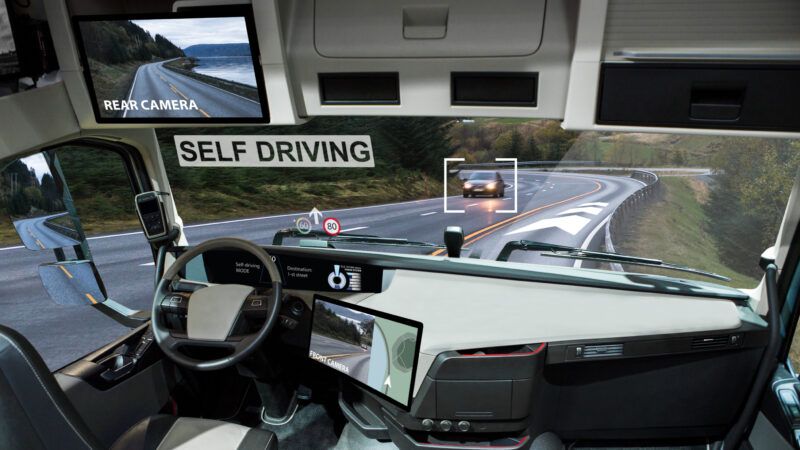California Considers Union-Backed Bill Requiring Driverless Trucks To Have a Driver in Them
The state's labor groups have explicitly said their policy is about protecting jobs from new technology.

California legislators and their union allies are pushing a bill that would preemptively ban the use of autonomous trucks on California's roads that don't have a human safety operator.
Working its way through the Legislature is A.B. 316, which would require that vehicles weighing 10,001 pounds or more have a human in the cab.
Sponsored by Assemblymember Cecilia Aguiar-Curry (D–Winters), the bill has the enthusiastic support of unionized truck drivers whoare explicit about their desire to protect jobs as well as public safety.
A.B. 316 is critical to "ensuring safety on California's roads and freeways, as well as the protection of thousands of truck-driving jobs in our state," said Jason Rabinowitz, president of the Teamsters Joint Council 7, in a press release when the bill passed the California Assembly's Transportation Committee.
Currently, 22 states allow heavier autonomous trucks to be tested on state roads, reports Commercial Carrier Journal. California isn't one of them, despite hosting the headquarters of a number of autonomous truck companies. For instance, the company TuSimple is headquartered in San Diego but tests its autonomous truck technology in Tucson, Arizona, and Fort Worth, Texas.
Earlier this year, the California Department of Motor Vehicles started to workshop the idea of letting heavy-duty trucks on the road via their own regulatory initiative. The DMV used a similar process to allow tests of lighter autonomous trucks weighing less than 10,001 in 2019.
The department's effort sent labor unions and legislators scrambling to prevent any testing of autonomous semis without a human operator.
"You don't create a safer environment if you have a 10,000-pound vehicle out there without a human safety net," said Lorena Gonzalez, head of the California Labor Federation and a former state lawmaker who championed the controversial, union-backed A.B. 5, which made it much more difficult for workers to be classified as independent contractors (often to the chagrin of the contractors themselves).
The California Labor Federation is co-sponsoring A.B. 316.
Critics of A.B. 316 include the autonomous vehicle industry and trade associations representing tech and business. They've argued that driverless trucks will enhance safety by cutting down on accidents caused by human error and grow the economy generally by cutting down on freight costs.
"Contrary to misconceptions, autonomous trucks will enhance safety on California's roads while supporting existing jobs and creating new ones," said Jeff Farrah, executive director of the Autonomous Vehicle Industry Association, in a statement.
In an email, the association cites data compiled by the U.S. Department of Transportation showing that autonomous vehicles have driven millions of miles over the past two years and have only witnessed one serious injury.
An April 2022 report from the Silicon Valley Leadership Group predicts that under "slow" and "medium" adoption scenarios for autonomous trucks, there will be slow attrition of long-haul trucker jobs as existing drivers retire and are not replaced. Under a "fast" adoption scenario, the report predicts there will be layoffs.
Autonomous trucks would also likely help make up for the estimated 78,000 trucker jobs that are currently unfilled, per the American Trucking Associations.
The aggregate benefits of autonomous trucks to growth and employment have some groups criticizing California's unions for trying to preserve their jobs at the expense of everyone else's.
"AB 316 is yet another example of unions trying to get back in control of the economy and new technologies—and putting their own self interests ahead of the wider public interest," wrote Krista Chavez from NetChoice, a tech policy group.
The Teamster's union for its part is pretty explicit that it doesn't want to see new technology threaten its members' jobs.
"Introducing technology with the sole purpose of eliminating jobs is not new or innovative. If the AVs are all about road safety, then AB 316 is a no brainer," said the California Teamsters Twitter account back in February.
Rent Free is a weekly newsletter from Christian Britschgi on urbanism and the fight for less regulation, more housing, more property rights, and more freedom in America's cities.


Show Comments (37)